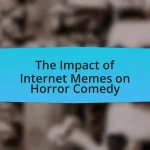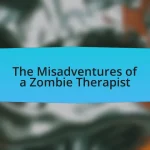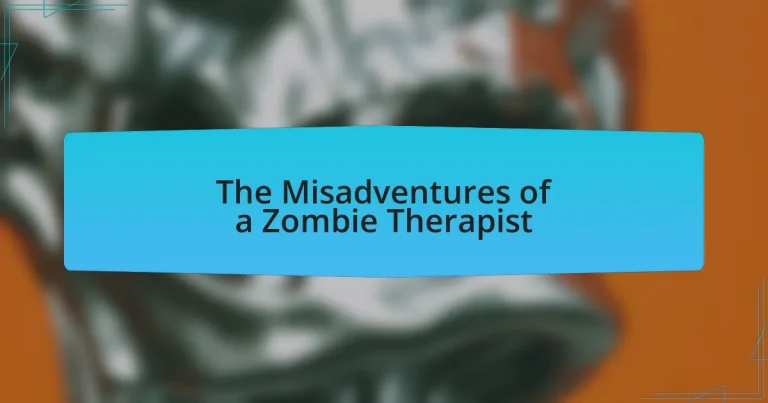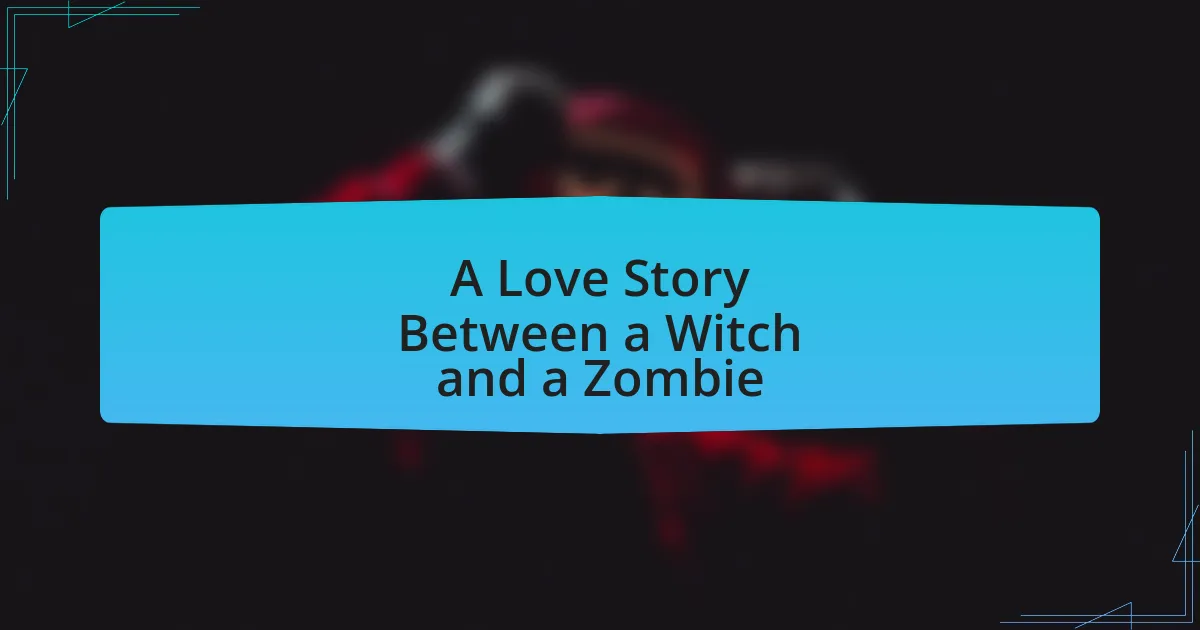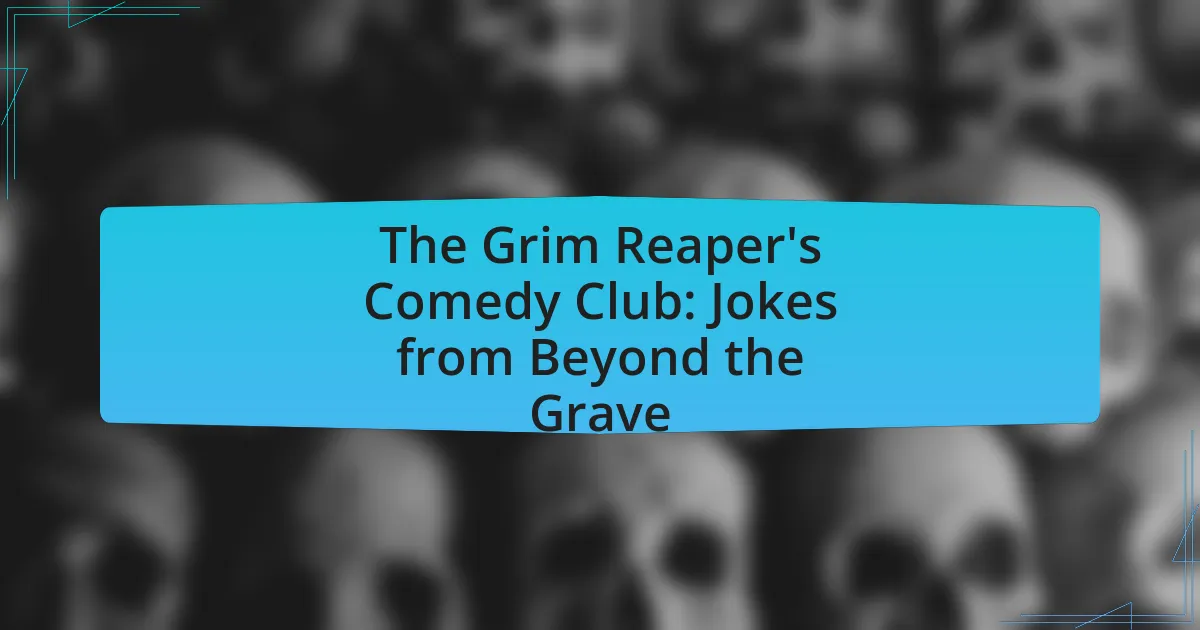The main entity of the article is “The Misadventures of a Zombie Therapist,” which explores the unique challenges faced by a therapist who is also a zombie. The article discusses the intersection of mental health and supernatural themes, highlighting issues such as communication barriers, societal stigma, and the complexities of establishing trust with clients. It examines the cultural influences that shaped the concept of a Zombie Therapist, the portrayal of zombies in media, and the moral dilemmas presented in the narrative. Key themes include mental health, identity, and the quest for acceptance, while also emphasizing the role of humor and empathy in therapeutic practices. The article ultimately reflects on broader societal issues and offers insights into improving therapist-client relationships.
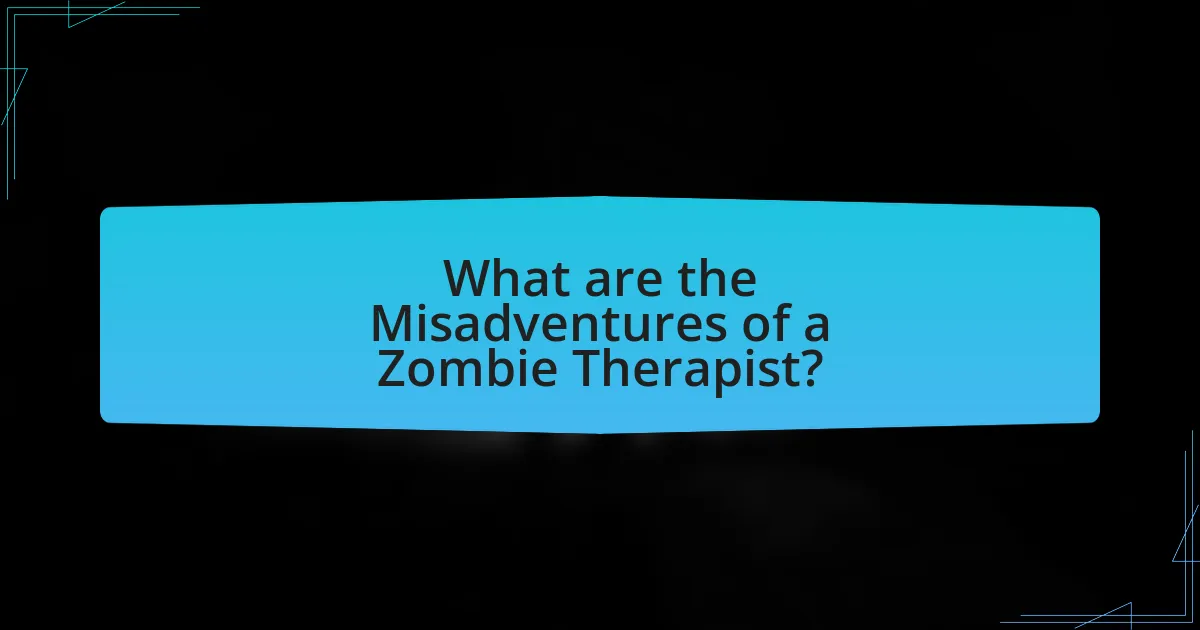
What are the Misadventures of a Zombie Therapist?
The misadventures of a zombie therapist involve navigating the challenges of providing mental health support while dealing with the unique circumstances of being undead. These challenges include communication barriers due to the zombie’s limited verbal skills, societal stigma against zombies, and the difficulty in establishing trust with living clients. Additionally, the therapist may face logistical issues, such as maintaining a professional appearance and managing cravings for human flesh, which can complicate therapy sessions. These elements create a humorous yet poignant exploration of the intersection between mental health and the supernatural.
How did the concept of a Zombie Therapist originate?
The concept of a Zombie Therapist originated from the intersection of horror fiction and psychological exploration, where the idea of a zombie, typically associated with mindlessness and decay, is juxtaposed with the role of a therapist, who embodies healing and mental wellness. This unique combination emerged in popular culture, particularly in literature and media, as a satirical commentary on the struggles of mental health and societal perceptions of therapy. The blending of these two contrasting elements serves to highlight the absurdity of certain societal norms while also providing a platform for discussing deeper psychological issues in a humorous or exaggerated manner.
What cultural influences shaped the idea of a Zombie Therapist?
The idea of a Zombie Therapist is shaped by various cultural influences, primarily rooted in folklore, horror literature, and contemporary media. Folklore from Haitian Vodou introduces the concept of zombies as reanimated corpses, often devoid of free will, which contrasts with the therapeutic notion of agency and healing. Horror literature, particularly works by authors like H.P. Lovecraft and Stephen King, has popularized the zombie as a metaphor for societal fears, such as loss of identity and the breakdown of social order. Additionally, contemporary media, including films and television shows like “The Walking Dead” and “iZombie,” have redefined zombies, portraying them as complex characters capable of emotional depth, thus allowing for the exploration of mental health themes through the lens of a therapist. These cultural narratives collectively inform the concept of a Zombie Therapist, blending traditional horror elements with modern psychological discourse.
How does the portrayal of zombies in media affect the perception of a Zombie Therapist?
The portrayal of zombies in media significantly influences the perception of a Zombie Therapist by framing them as either monstrous or misunderstood figures. In popular culture, zombies are often depicted as mindless, violent creatures, which can lead to a perception of a Zombie Therapist as dangerous or untrustworthy. Conversely, when media portrays zombies with depth, showcasing their struggles and humanity, it fosters empathy and acceptance towards the concept of a Zombie Therapist. For instance, in shows like “iZombie,” the character’s ability to retain human traits while navigating societal challenges creates a more nuanced view, suggesting that a Zombie Therapist could provide valuable insights into the emotional and psychological aspects of being undead. This duality in representation shapes public attitudes, either reinforcing stigma or promoting understanding.
What challenges does a Zombie Therapist face?
A Zombie Therapist faces unique challenges primarily related to the stigma surrounding zombies and their mental health needs. This stigma can lead to societal rejection, making it difficult for the therapist to establish trust and rapport with clients. Additionally, the therapist must navigate the complexities of treating clients who may have limited communication abilities or behavioral issues due to their undead state. Research indicates that mental health professionals often encounter biases that can hinder effective treatment, as seen in studies on stigma in mental health care (Corrigan, 2004). These factors complicate the therapist’s ability to provide effective care and support for their clients.
How do societal views on zombies impact the therapist’s practice?
Societal views on zombies significantly impact a therapist’s practice by shaping client perceptions and therapeutic approaches. For instance, if society views zombies as purely fictional or humorous, therapists may find it challenging to address clients’ serious concerns related to trauma or anxiety associated with zombie-related media. Conversely, if zombies are perceived as a metaphor for societal issues, therapists might incorporate discussions about identity, fear, and societal decay into their sessions. Research indicates that cultural narratives influence mental health discourse, suggesting that therapists must navigate these societal views to effectively engage with clients and validate their experiences.
What unique obstacles arise in therapy sessions with zombie clients?
Therapy sessions with zombie clients present unique obstacles primarily due to their inability to communicate effectively. Zombies typically lack coherent speech and cognitive function, making it challenging for therapists to understand their needs or emotions. Additionally, the physical presence of a zombie can evoke fear or discomfort in the therapist, potentially hindering the therapeutic process. The lack of emotional responsiveness from zombie clients further complicates the establishment of a therapeutic alliance, which is crucial for effective therapy. These factors collectively create an environment where traditional therapeutic techniques may be ineffective, as evidenced by the fundamental requirement for verbal interaction and emotional engagement in most therapeutic models.
What are the key themes explored in the Misadventures of a Zombie Therapist?
The key themes explored in the Misadventures of a Zombie Therapist include mental health, identity, and the struggle for acceptance. The narrative delves into the complexities of therapy from the perspective of a zombie, highlighting the challenges of understanding one’s own identity while grappling with societal perceptions of mental health. Additionally, the story examines the quest for acceptance in a world that often stigmatizes those who are different, using the zombie therapist’s experiences to reflect broader issues of empathy and connection in human relationships.
How does humor play a role in the narrative of a Zombie Therapist?
Humor serves as a critical mechanism in the narrative of a Zombie Therapist by providing levity in an otherwise dark and macabre setting. The juxtaposition of a zombie engaging in therapeutic practices creates absurdity, allowing for comedic situations that challenge traditional horror tropes. For instance, the therapist’s attempts to connect with human clients while grappling with their own undead condition often lead to humorous misunderstandings and ironic scenarios, such as misinterpreting emotional cues due to their lack of human experience. This comedic element not only entertains but also offers commentary on the human condition, illustrating themes of isolation and the quest for understanding in a world filled with chaos. The humor thus enriches the narrative, making it accessible and relatable while maintaining engagement through its unique premise.
What moral dilemmas are presented in the story?
The story “The Misadventures of a Zombie Therapist” presents several moral dilemmas, primarily revolving around the ethics of therapy for non-human entities and the implications of consent. The protagonist, a zombie therapist, grapples with the question of whether it is morally acceptable to provide therapy to beings who are traditionally viewed as lacking autonomy or sentience. This raises issues about the nature of mental health treatment and the rights of individuals, regardless of their physical state. Additionally, the therapist faces the dilemma of whether to prioritize the well-being of their zombie clients over societal norms that stigmatize them, challenging the boundaries of empathy and professional responsibility. These dilemmas highlight the complexities of moral decision-making in unconventional contexts, emphasizing the need for a nuanced understanding of ethics in therapy.
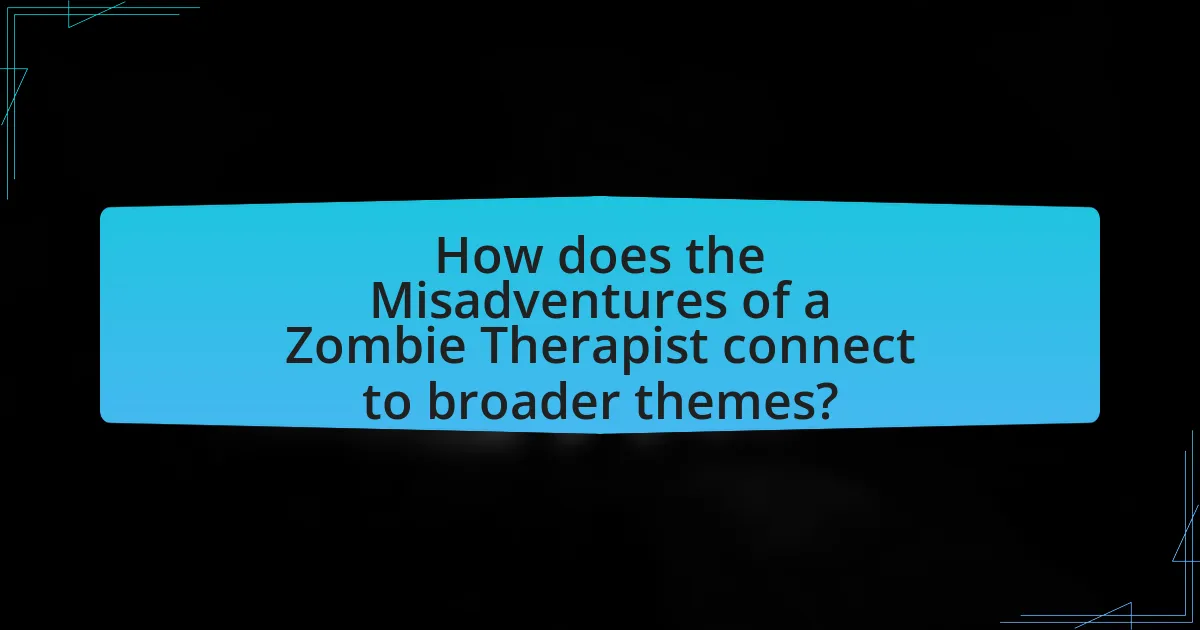
How does the Misadventures of a Zombie Therapist connect to broader themes?
The Misadventures of a Zombie Therapist connects to broader themes such as mental health, societal acceptance, and the human condition. The narrative explores the challenges faced by the zombie therapist, who symbolizes individuals grappling with their own mental health issues while trying to help others. This connection highlights the stigma surrounding mental illness and the importance of empathy and understanding in therapeutic relationships. Furthermore, the story reflects on the absurdity of societal norms, illustrating how those who are different, like the zombie, often face isolation and misunderstanding, thereby prompting discussions about acceptance and the complexities of identity.
What parallels exist between zombie therapy and real-world mental health practices?
Zombie therapy parallels real-world mental health practices through the use of exposure therapy and the therapeutic alliance. In zombie therapy, individuals confront their fears in a controlled environment, similar to how exposure therapy helps patients gradually face anxiety-inducing situations to reduce their fear response. Additionally, both approaches emphasize the importance of a strong therapeutic relationship, which is crucial for effective treatment outcomes. Research indicates that a supportive therapist-client relationship enhances engagement and promotes healing, mirroring the dynamics observed in zombie therapy scenarios where trust and safety are established.
How does the story reflect societal issues through the lens of a Zombie Therapist?
The story reflects societal issues through the lens of a Zombie Therapist by illustrating themes of alienation, mental health stigma, and the struggle for acceptance. The Zombie Therapist, representing marginalized individuals, navigates a world that fears and misunderstands him, mirroring how society often treats those with mental health challenges. This character’s interactions highlight the importance of empathy and understanding, as he seeks to help others while grappling with his own identity crisis. The narrative underscores the need for societal change regarding mental health perceptions, emphasizing that everyone deserves compassion and support, regardless of their circumstances.
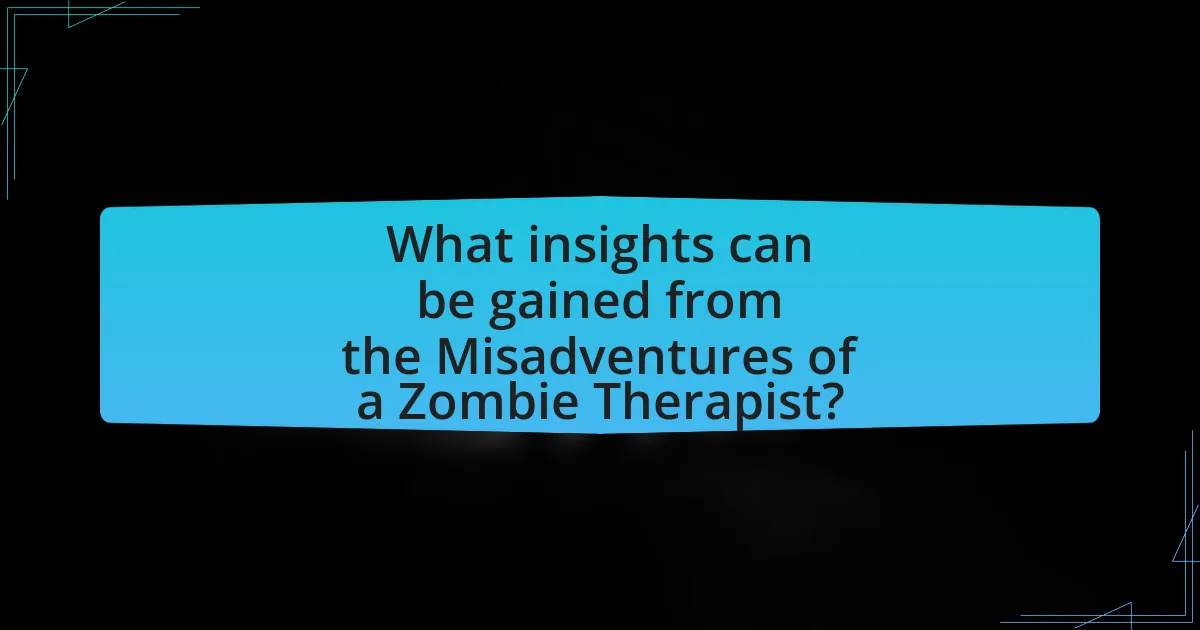
What insights can be gained from the Misadventures of a Zombie Therapist?
The Misadventures of a Zombie Therapist provides insights into the complexities of mental health, identity, and societal perceptions of the ‘other.’ The narrative explores how a zombie, typically viewed as a mindless creature, engages in therapeutic practices, challenging preconceived notions about capability and empathy. This juxtaposition highlights the importance of understanding diverse perspectives in mental health care, emphasizing that even those marginalized by society can contribute meaningfully to discussions about well-being. The story illustrates that healing and understanding can emerge from the most unexpected sources, prompting readers to reconsider their biases and the nature of therapy itself.
What lessons about empathy and understanding can be drawn from the narrative?
The narrative of “The Misadventures of a Zombie Therapist” teaches that empathy and understanding are crucial for effective communication and connection, even in unconventional circumstances. The story illustrates how the zombie therapist, despite being an undead creature, demonstrates compassion and active listening, which fosters trust and healing in his clients. This highlights that empathy transcends physical appearances and societal norms, emphasizing the importance of recognizing shared human experiences. The therapist’s ability to relate to his clients’ struggles, regardless of his own condition, serves as a powerful reminder that understanding others’ perspectives can lead to meaningful relationships and personal growth.
How can the experiences of a Zombie Therapist inform our approach to mental health?
The experiences of a Zombie Therapist can inform our approach to mental health by highlighting the importance of empathy and understanding in therapeutic relationships. This fictional character navigates the complexities of mental health issues, illustrating how unconventional perspectives can lead to innovative therapeutic techniques. For instance, the Zombie Therapist’s unique experiences may encourage mental health professionals to adopt a more inclusive and flexible approach, recognizing that traditional methods may not resonate with all clients. This aligns with research indicating that diverse therapeutic modalities can enhance client engagement and outcomes, as seen in studies that advocate for personalized treatment plans tailored to individual needs.
What strategies can be applied from the story to improve therapist-client relationships?
To improve therapist-client relationships, strategies such as active listening, empathy, and establishing trust can be applied. Active listening involves fully concentrating on what the client is saying, which fosters a sense of validation and understanding. Empathy allows therapists to connect with clients on an emotional level, making clients feel heard and supported. Establishing trust is crucial; therapists can achieve this by being consistent, maintaining confidentiality, and creating a safe environment for open communication. These strategies are supported by research indicating that strong therapeutic alliances lead to better client outcomes, as highlighted in studies like the one conducted by Horvath and Symonds (1991) in the Journal of Consulting and Clinical Psychology, which found that the quality of the therapist-client relationship significantly predicts treatment success.
What practical tips can be learned from the Misadventures of a Zombie Therapist?
Practical tips from “The Misadventures of a Zombie Therapist” include the importance of empathy in therapy, as the zombie therapist learns to connect with clients despite his condition. This highlights that understanding clients’ emotions can lead to better therapeutic outcomes. Additionally, the narrative emphasizes the value of adaptability; the zombie therapist must adjust his methods to effectively communicate and help his clients, demonstrating that flexibility is crucial in any therapeutic setting. Lastly, the story illustrates the significance of humor in therapy, as the zombie therapist uses light-heartedness to ease tension, suggesting that a positive atmosphere can facilitate healing.
How can therapists apply humor in their practice effectively?
Therapists can apply humor effectively in their practice by using it to create a safe and comfortable environment for clients. Humor can help reduce anxiety, foster rapport, and facilitate open communication. Research indicates that humor can enhance therapeutic outcomes by promoting positive emotions and resilience, as evidenced by a study published in the Journal of Humor Research, which found that humor can improve coping strategies in therapy settings. By integrating appropriate humor, therapists can encourage clients to view their challenges from a different perspective, ultimately aiding in the therapeutic process.
What are best practices for addressing unconventional client backgrounds?
Best practices for addressing unconventional client backgrounds include actively listening to clients, demonstrating cultural competence, and tailoring therapeutic approaches to individual needs. Active listening fosters trust and understanding, allowing therapists to grasp the unique experiences and perspectives of clients from diverse backgrounds. Cultural competence involves recognizing and respecting the cultural factors that influence a client’s worldview, which can enhance the therapeutic relationship. Tailoring therapeutic approaches ensures that interventions are relevant and effective, as evidenced by studies showing that personalized therapy increases client engagement and outcomes. For instance, research published in the Journal of Counseling Psychology indicates that culturally adapted interventions lead to better results for clients from unconventional backgrounds.


